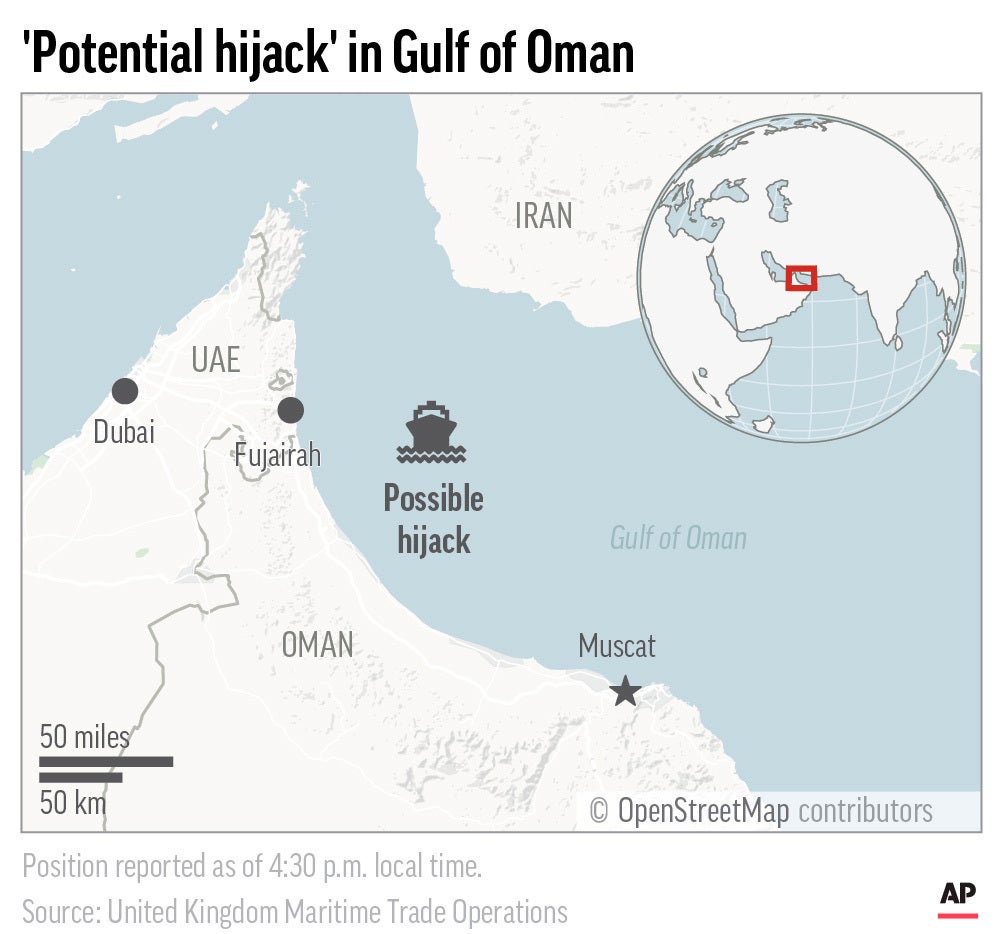British navy group: 'Potential hijack' of ship off UAE coast
The British navy has warned of a “potential hijack” of a ship off the coast of the United Arab Emirates in the Gulf of Oman, without elaborating

Your support helps us to tell the story
From reproductive rights to climate change to Big Tech, The Independent is on the ground when the story is developing. Whether it's investigating the financials of Elon Musk's pro-Trump PAC or producing our latest documentary, 'The A Word', which shines a light on the American women fighting for reproductive rights, we know how important it is to parse out the facts from the messaging.
At such a critical moment in US history, we need reporters on the ground. Your donation allows us to keep sending journalists to speak to both sides of the story.
The Independent is trusted by Americans across the entire political spectrum. And unlike many other quality news outlets, we choose not to lock Americans out of our reporting and analysis with paywalls. We believe quality journalism should be available to everyone, paid for by those who can afford it.
Your support makes all the difference.The British navy warned Tuesday of a “potential hijack” of a ship off the coast of the United Arab Emirates in the Gulf of Oman, without elaborating.
The incident comes amid heightened tensions between Iran and the West over Tehran s tattered nuclear deal with world powers and as commercial shipping in the region has found itself caught in the crosshairs. Most recently, the U.S., the U.K. and Israel have blamed Iran for a drone attack on an oil tanker off the coast ofo Oman that killed two people. Iran has denied involvement.
The British military’s United Kingdom Maritime Trade Operations initially warned ships Tuesday that “an incident is currently underway" off the coast of Fujairah Hours later, they said the incident was a “potential hijack," but provided no further details.
Shipping authority Lloyd’s List and maritime intelligence firm Dryad Global both identified the vessel involved as Panama-flagged asphalt tanker Asphalt Princess. The vessel's owner, listed as Emirati free zone-based Glory International, could not immediately be reached for comment late Tuesday.
The U.S. military’s Mideast-based 5th Fleet and the British Defense Ministry did not immediately return calls for comment. The Emirati government did not immediately acknowledge the incident.
Earlier, six oil tankers announced around the same time via their Automatic Identification System trackers that they were “not under command,” according to MarineTraffic.com. That typically means a vessel has lost power and can no longer steer.
“At the same time, if they are in the same vicinity and in the same place, then very rarely that happens,” said Ranjith Raja, an oil and shipping expert with data firm Refintiv. “Not all the vessels would lose their engines or their capability to steer at the same time."
One of the vessels later began moving.
An Oman Royal Air Force Airbus C-295MPA, a maritime patrol aircraft, flew in circles for hours over the waters, according to data from FlightRadar24.com.
Apparently responding to the incident, Foreign Ministry spokesman Saeed Khatibzadeh called the recent maritime attacks in the Persian Gulf “completely suspicious.” He denied that Iran was involved.
"Iran’s naval forces are ready for help and rescue in the region,” Khatibzadeh said.
The event comes just days after a drone struck an oil tanker linked to an Israeli billionaire off the coast of Oman, killing two crew members. The West blamed Iran for the attack, which marked the first known assault to have killed civilians in the yearslong shadow war targeting commercial vessels in the region.
Iran denied playing any role in the incident, though Tehran and its allied militias have used similar “suicide” drones in past attacks.
Israel, the United States and United Kingdom vowed a “collective response” to the attack, without elaborating.
The Gulf of Oman is near the Strait of Hormuz, the narrow mouth of the Persian Gulf through which a fifth of all oil passes. Fujairah, on the UAE’s eastern coast, is a main port in the region for ships to take on new oil cargo, pick up supplies or trade out crew.
For the past two years, the waters off Fujairah have seen a series of explosions and hijackings. The U.S. Navy blamed Iran for a series of limpet mine attacks on vessels that damaged tankers.
In July 2019, Iran seized the British-flagged Stena Impero in the Strait of Hormuz as it was headed from the Iranian port of Bandar Abbas to Dubai The raid came after authorities in Gibraltar, a British overseas territory, seized an Iranian supertanker carrying $130 million in crude oil on suspicion it was breaking European Union sanctions by taking the oil to Syria. Both vessels were later released.
Last year, an oil tanker sought by the U.S. over allegedly circumventing sanctions on Iran was hijacked off the Emirati coast in July, following months of tensions between Iran and the U.S. The vessel and its crew ended up in Iran, though Tehran never acknowledged the incident.
And in January, armed Iranian Revolutionary Guard troops stormed a South Korean tanker and forced the ship to change course and travel to Iran. While Iran insisted it stopped the ship for polluting, it came as Tehran sought to increase its leverage over Seoul ahead of negotiations over billions of dollars in Iranian assets frozen in South Korean banks.
___
Associated Press writer Nasser Karimi in Tehran, Iran, contributed to this report.
___
Follow Isabel DeBre and Jon Gambrell on Twitter at www.twitter.com/isabeldebre and www.twitter.com/jongambrellAP.